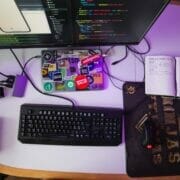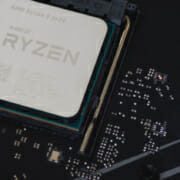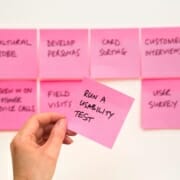What You Need Before Developing An Android App
Developing an android app requires a deep understanding of design and programming. When approaching a new technology or project, it’s advisable to break it down into pieces. If you’re an experienced website developer, many of the techniques (and tools) involved in Android app development will be synonymous with things you already know.
Building mobile apps requires the mastery of more nuanced concepts. Mobile devices have simpler processors, smaller screens, and in the case of android devices, different manufacturers. Developers should keep their codes flexible and account for various user-interface scenarios. So, what does it take to become a qualified or expert android developer?
Here’s what you need before developing your android app.
- Java
Java is the best programming language that underscores Android mobile app development. For those who have gained their programming experiences from languages like Ruby and JavaScript, there can be a learning curve when using the Java programming language for the first time. Like Ruby and JavaScript, Java is object-oriented; but it’s stricter about processing different data types. Developers need to be careful with their codes by defining the different data types, using, and allocating scarce memory resources.
- XML Understanding
XML is a language that defines a set of rules for encoding documents in a format that is human-readable and machine-readable. XML was created as a standard approach to encode data for internet-based mobile applications. The XML is a structured mark-up language that shares many features with HTML including; angled brackets, tag types, and the deep nesting of elements. In short, XML allows information to be conveyed between devices in a manner that can be understood easily.
- Android Software Development Kit SDK
The software development kit SDK may conjure up images of a briefcase packed up with all sorts of spy tools. But in essence, it’s a fancy name for a set of pre-packaged codes. Android SDK is a module of Java code that extends developers access to mobile devices functions and capabilities like accelerometer and camera. One key element of the Android SDK is a library called Gradle. So, let’s say you want to integrate a social media platform like Facebook with your application. To do this, you’d download a code library from Facebook, then tell Gradle you’re using this code so that when your application compiles, your code remains well-organized.
- Android Studio
The integrated development environment for Android developers is the Android Studio. Android Studio is designed on top of the well-respected IntelliJ IDE and comes with great out-of-the-box support for many of the most common software development kits.
Android studio also entails many features and capabilities that developers expect of a fully-fledged IDE environment. For instance, the code completion feature makes auto-complete suggestions as you type. Code debuggers help you review your code to identify sources of error.
- APIs
As an android developer, you will want to interact with many other services. For instance, you may want your users to access a calendar or events sessions from a third-party service provider – or even check the stock market. An android app development company usually offers APIs and will show you exactly how to query them for data in a consistent, secure way. While you’re free to interact with an existing API, Google makes it easy to connect to their APIs using android apps. For instance, you can use Google APIs to monitor the geo-location of your users.
- Database
If your app handles huge amounts of data, most likely the data won’t stay on the device for long. Instead, your app will most likely interact with a database living outside your phone. Cloud services like Parse and Firebase provide simple APIs to host data in the cloud and make it available across different devices. These cloud platforms provide Java libraries to plug in your app, making it easy to cache data on the user’s device.
This synching of data between remote database and local storage is vital if you want your users to use the app while they’re offline. So, before developing an Android app, ensure to have adequate storage. That is achieved by outsourcing cloud services that provide a simple API to secure your app’s data.
How To Become a Better Android Developer?
Becoming an Android developer is easy but being an expert developer who stands from the crowd is difficult. It takes a great deal of passion, dedication, and perseverance to become great at design and programming. So, what do you need to become a better Android developer?
- Get familiar with android framework internals. It’s advisable to get familiar with Android’s actual framework code. Many developers are afraid of delving right into the Android framework internals. Luckily, it’s amazing how much you can discover how things work.
- Get over the fear of missing out. Android is quite big. You cannot learn it end-to-end in a month or three months. The more you learn, the more you understand how much you don’t know. As a beginner, it’s perfectly normal to feel that you’re missing out on learning crucial information.
- Start reading more code. Most developers don’t take the time to read what other developers are writing. Instead, they spend more time writing the codes they already know. The best way to become an Android developer is to read the excellent codes of more experienced developers.
- Learn more languages. It’s crucial that you learn more programming languages. You need to keep yourself updated with the industry’s happenings rather than confining your thinking to the Android space. Learning more languages and opening your mind to new possibilities will inspire new ideas, open up your perspective, and help you improve your Android development skills significantly.
- Learn Java design patterns. Learning Java design patterns is crucial in your Android development career. Whenever you’re stuck in solving programming problems, design patterns can be lifesavers. You also need to be on the same page with other designers and programmers so that when they’re talking about using a Decorator, Factory, or Façade pattern, you instantly know what they mean.
- Contribute to open source. If you have developed a plugin, library, or any other useful piece of code, consider open-sourcing it. There’s much to learn in the process of maintaining your projects or contributing to open source projects. Contributing to open-source is an excellent crash course in open-source development that will exponentially increase your value as a developer.
- Make your IDE work for you. Start spending more time understanding the integrated design environment you are using: Android studio. The IDE can do much more than you think. There are many cool features hidden in the IDE that most developers don’t even consider. Make it a habit to discover new and better ways of making your tools work for you, thereby improving your productivity and workflow.
NS804 – Kick-starting Your Android App Development
Android app development comes with many benefits. Firstly, android app development features higher returns on investments with lower costs; the availability of the Android software development toolkit provides cost savings to individual developers. In addition, Android app development comes with faster deployment cycles, offering a competitive advantage to companies willing to have a quicker go-to-market for new ideas. Other benefits include targeting multiple platforms, versatility, scalability, security, and easy customization.
Contact NS804 for timely android app development solutions.

 https://pixabay.com/photos/phone-tablet-screen-mobile-smart-793046/
https://pixabay.com/photos/phone-tablet-screen-mobile-smart-793046/









 https://pixabay.com/photos/phone-android-apps-world-map-1869510/
https://pixabay.com/photos/phone-android-apps-world-map-1869510/
Leave a Reply
Want to join the discussion?Feel free to contribute!